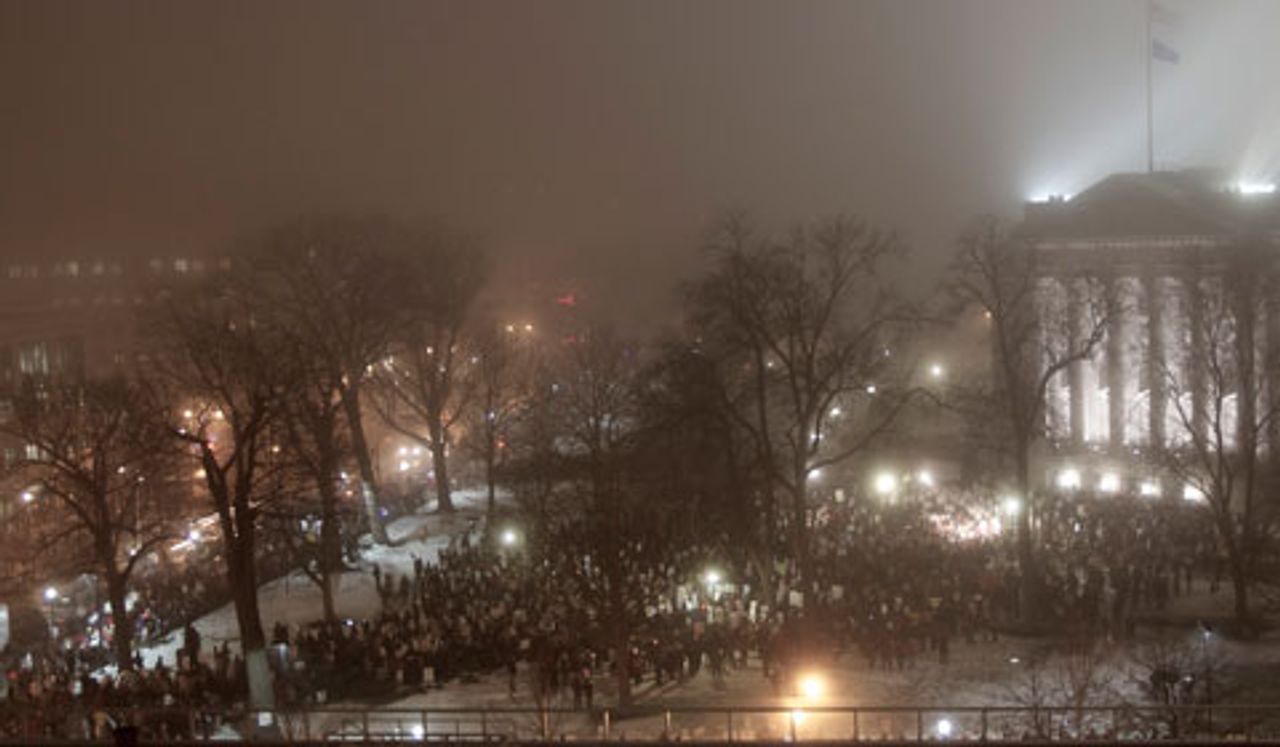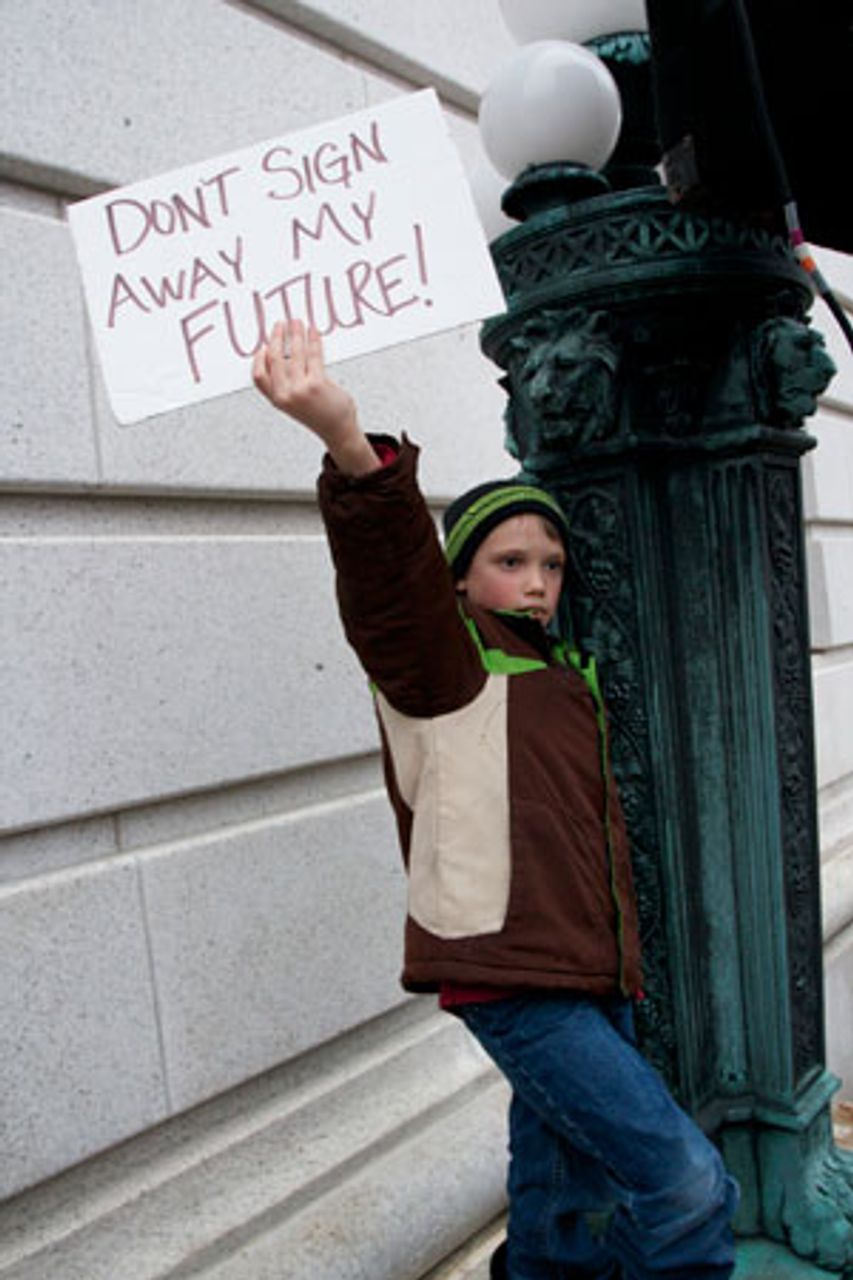 Protesters gather in front of the state capitol building in Madison
Protesters gather in front of the state capitol building in MadisonOn Wednesday a crowd estimated at about 30,000 demonstrated in Madison, the capital of Wisconsin, against attacks on the wages and conditions of public sector workers launched by Governor Scott Walker. The demonstrations, which continued throughout the day and peaked at noon and again in the early evening, followed a Tuesday protest estimated at between 13,000 and 20,000 and a series of rallies, demonstrations, and school walk-outs across the state.
Officials ordered the closures of Madison’s public school system after 40 percent of teachers had called in before Wednesday morning to declare a sick day in order to attend the rally. Busloads of demonstrators continued to arrive in the capital from throughout the state. Near Milwaukee, a crowd estimated at 1,500 marched on Walker’s suburban home. About 1,000 high school students staged a walkout in the city of Appleton.
In an effort inspired by Egyptian demonstrators in Cairo’s Tahrir Square, dozens of workers and youth camped out in the Statehouse overnight between Tuesday and Wednesday. They have promised to continue the occupation until Walker’s bill is defeated.
It is anticipated that the protests will continue Thursday and Friday. Schools throughout the state are bracing for teacher absences and student walkouts. A large walkout of University of Wisconsin-Madison undergraduates and graduate students is expected Thursday.
 A student
A studentWalker’s plan, which may be passed in some form by the weekend, is a far-reaching attack on workers. Among a bevy of proposals, the bill would bar workers from negotiating over pensions, health care benefits, or workplace conditions. Only pay would be subject to bargaining, but it would be locked into raises no greater than annual increases in the Consumer Price Index. Public workers would be forced to nearly double their contributions to pensions and health care plans.
Beyond these draconian measures, Walker has enraged workers with the anti-democratic way he has demanded them. On February 11, he announced that he had put the National Guard on alert to deal with any worker resistance.
The last time the National Guard was called out in Wisconsin to deal with striking workers was the May First eight-hour day movement in 1886, when in the days after the Haymarket riot in Chicago the state militia opened fire on striking steel workers in Milwaukee, killing seven.
Walker’s bill arrogates to his office dictatorial powers that recall the rampant abuse of executive authority by 19th-century governors. According to a press release from Walker’s office, “if Governor has declared a state of emergency, the bill authorizes appointing authorities to terminate any employees that are absent for three days without approval of the employer or any employees that participate in an organized action to stop or slow work.”
One of the most striking elements of the demonstrations in Madison is the support they have won from the youth. In addition to the Wednesday walkout in Appleton, over 800 Madison East High School Students, more than 50 percent of the school, staged a walkout and marched two-and-a-half miles to the capitol building on Tuesday. A single high school student, Ona Powell, is credited with organizing the strike through a Facebook page and word-of-mouth. On Monday, high school students struck in Stoughton, an industrial town near Madison.
Undergraduate and graduate students at the University of Wisconsin, Madison, have been prominent in the demonstrations there, and students at the University of Wisconsin campuses in Milwaukee and Superior have also joined protests.
On Tuesday, Walker attempted to campaign for his bill in the western Wisconsin cities of La Crosse and Eau Claire. In each city he was met by hundreds of demonstrators. In Eau Claire, his vehicle had to deviate from its intended course and enter a factory from the rear.
Walker is consciously attempting to turn private sector workers against their class brothers and sisters in the public sector. In La Crosse he told steelworkers that industrial workers in Wisconsin have made enormous “sacrifices,” so government workers should to the same. “What I’m asking for pales in comparison to what everybody else is doing in the private sector,” he said. “We think these are reasonable, modest changes. I think most employees outside of government would say this is a pretty good deal.”
These attempts were not successful, however. By all accounts the large demonstrations in Madison were attended by many workers from the private sector.
The public sector unions who have called the protests—among them the Wisconsin branches of the the American Federation of Teachers (AFT), National Education Association (NEA), and American Federation of State, County and Municipal Employees (AFSCME)—have presented them as a lobbying effort to sway a handful of Republican senators to vote against elements of Walker’s bill.
The unions are not interested in defending either working class living standards or the right to strike—as proved only too well by the NEA and AFT, which have both backed the Obama administration’s assault on public education and work rules known as Race to the Top. All the public sector unions have abided by reactionary laws forbidding government workers from striking.
In Wisconsin, the unions are primarily motivated by a measure in the bill that would ban the automatic dues check-off, which would threaten to eliminate millions of dollars from their revenues. The unions funnel this money to the same Democratic Party that in numerous states, and at the national level under the Obama administration, is spearheading the attack on government workers’ wages and jobs. The only difference is that the Democrats “work together” with the union official to implement the cuts, while Republicans prefer not to deal with the union bureaucracies.
The social demands animating demonstrators in Madison and around Wisconsin are entirely opposed to the pro-austerity line supported by the trade unions . They see their struggle as a fight against wage-cutting, anti-democratic attacks on workers’ rights, and the abuses and humiliations of a political system that constantly demeans their work. Indeed, numerous signs at the rallies and comments in interviews make clear that workers and youth in Wisconsin identify with the uprising of the Arab workers and youth against US-backed tyrants in the Middle East.
 Christine Hendricks and Melinda Foster
Christine Hendricks and Melinda Foster“The government only wants the rich to get richer, and it’s leaving the working and middle class behind,” Melinda Foster, a radiology technician at the University of Wisconsin hospital, told the World Socialist Web Site. “Why can’t we cut the billionaires’ and executives’ pay?”
Sally, a teacher, said the budget cuts would make paying her bills much harder. “This last winter was really tough for me,” she said. “I ended up borrowing money just to pay my property taxes. I am working another job in addition to being a teacher. At least I’m not putting kids through college. We don’t have cushy jobs; many of us are working paycheck to paycheck to make ends meet.”
Edson, a teaching assistant at the University of Wisconsin Madison, compared the development to the toppling of dictators in the Middle East. “When the government stops listening to us, that’s when it becomes like Egypt,” he said.
Their desire to defend their jobs, wages, and rights, and their striving for greater solidarity with other workers—in different trades, states, and even nations—inevitably brings workers and youth into conflict with the trade unions and the corporate-controlled two party system. But these sentiments must find independent forms of struggle and ultimately a conscious political expression in the struggle for socialism.
The demonstrations in Wisconsin have put paid to the myth of the passive and backward American worker. The next step in this fight is for broader sections of the working class follow the initiative in Wisconsin and enter into struggle against wage-cutting and anti-democratic abuses.
